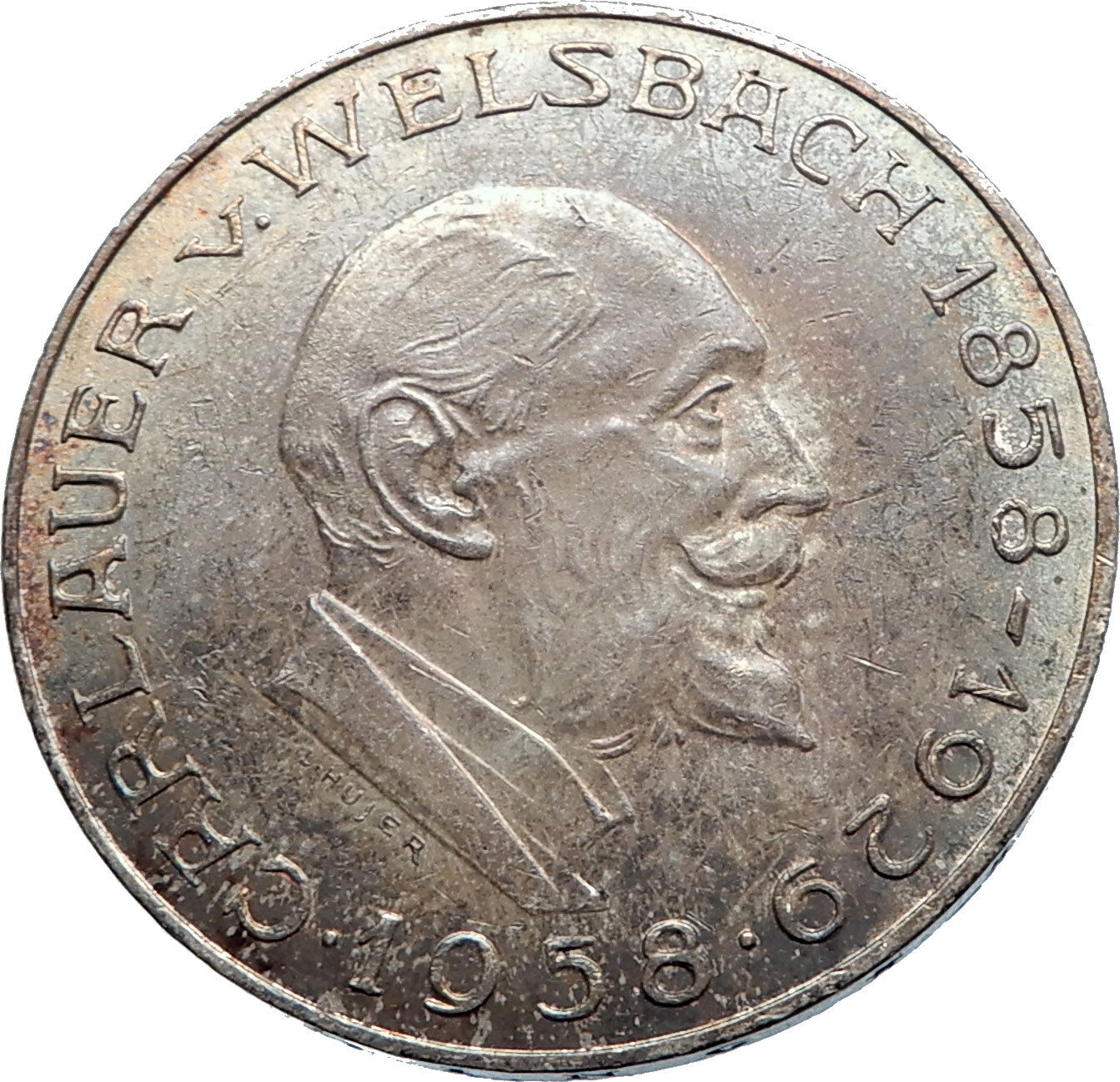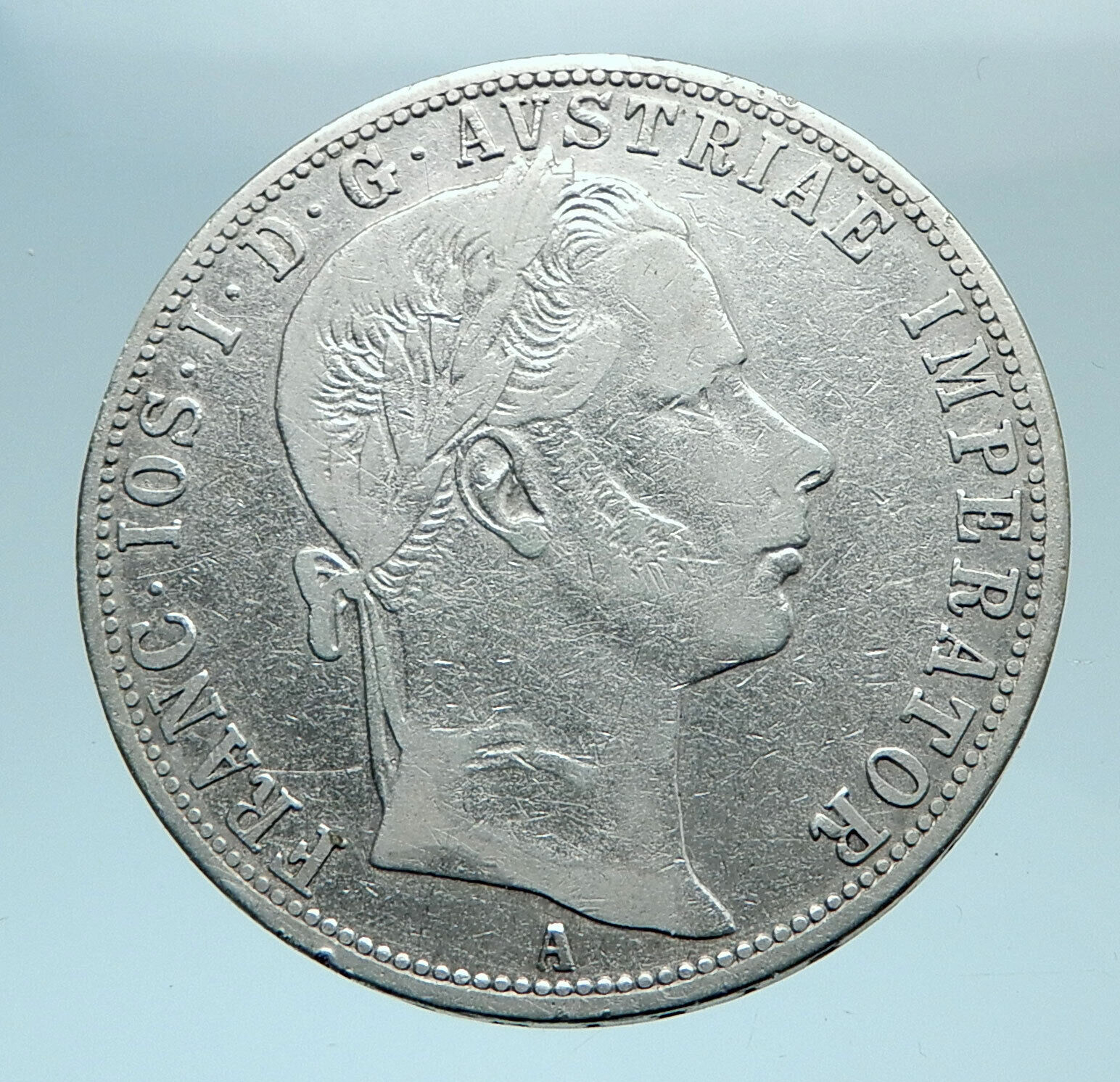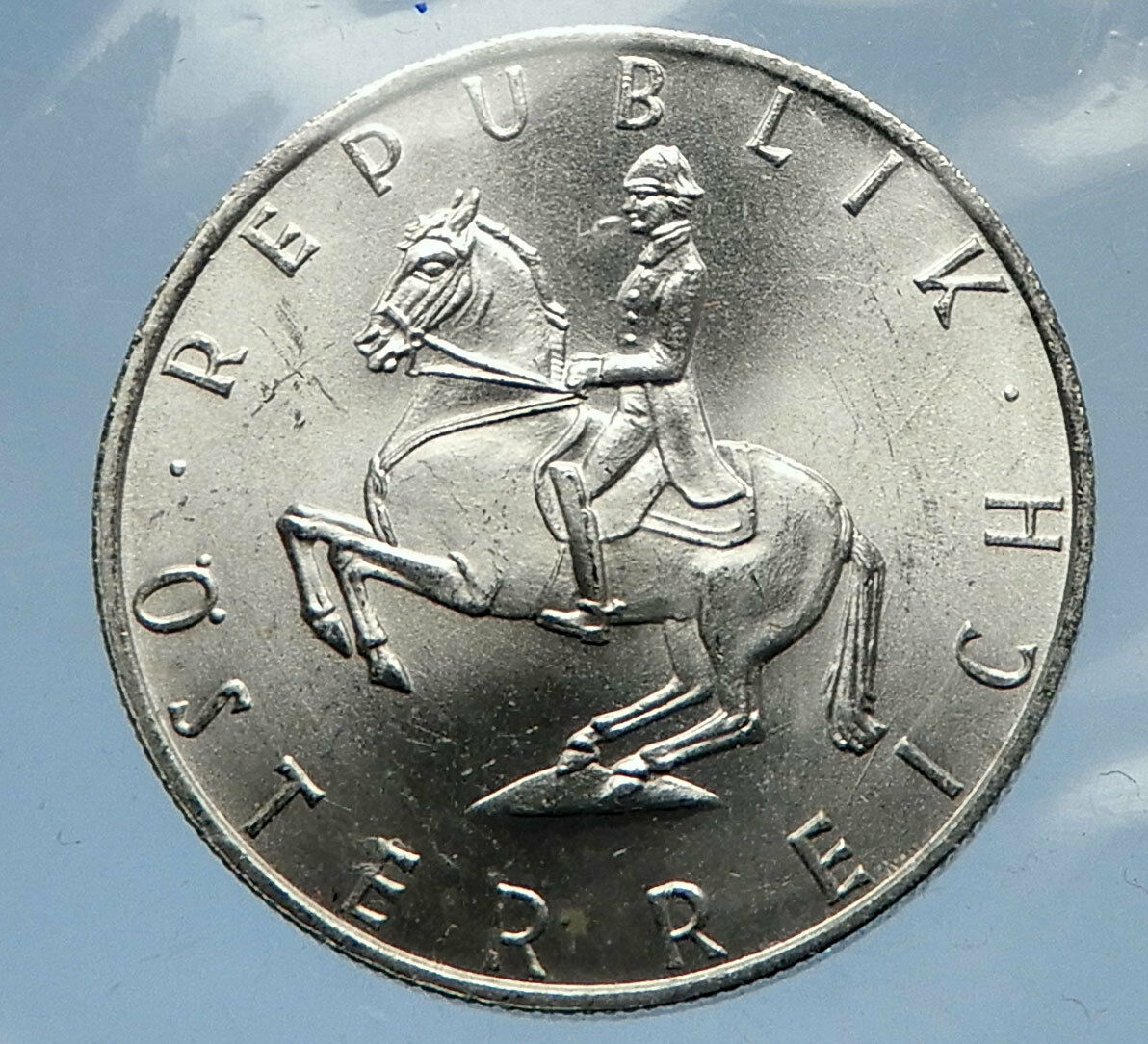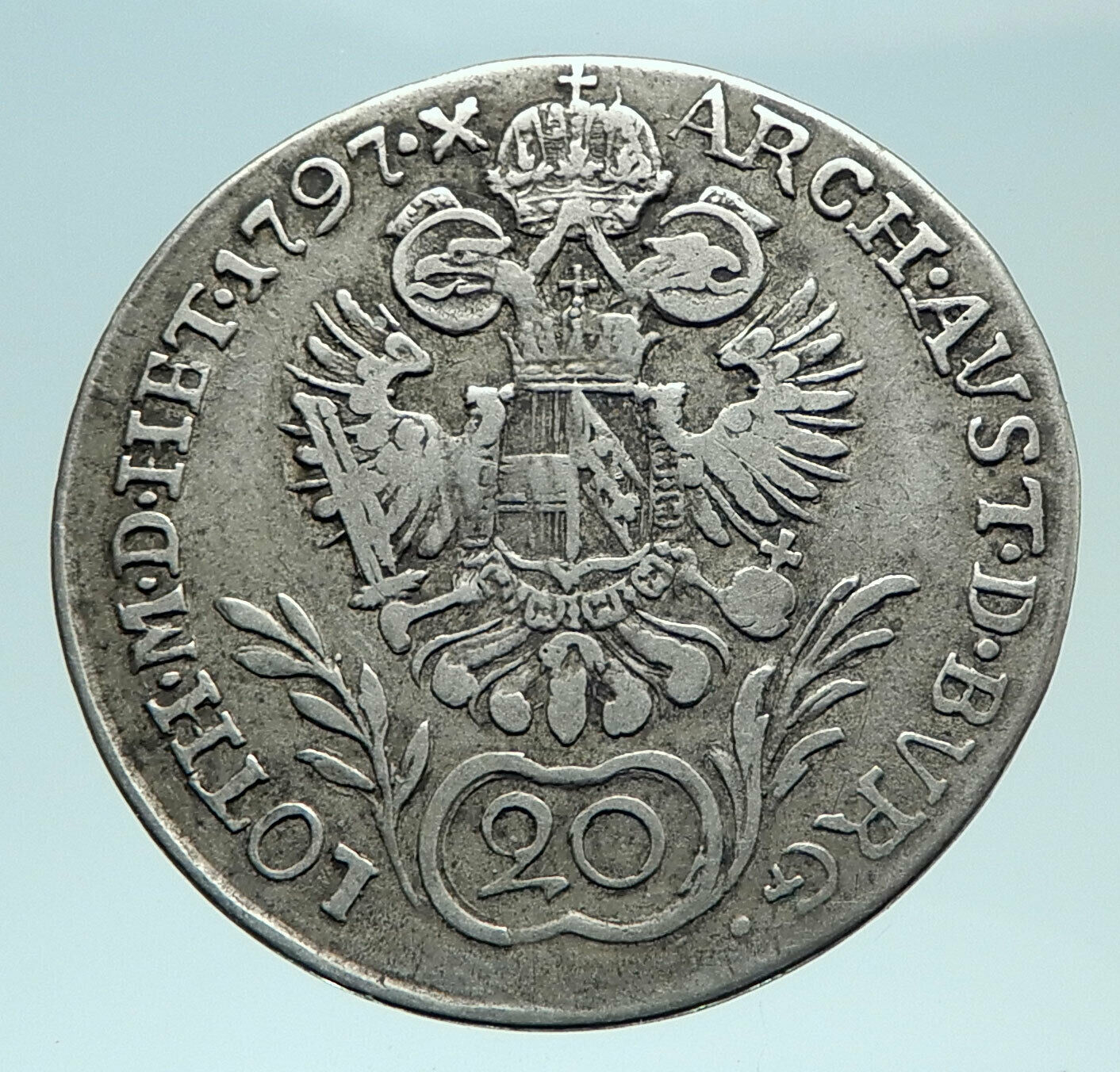|
Austria
1957 10 Schilling 27mm (7.37 grams) 0.640 Silver (0.1533 oz. ASW)
Reference: KM# 2882 (1957-1964*-1973)
ÖSTERREICH ◦ REPUBLIC, Austrian shield.
10 SCHILLING WELZ, Woman of Wachau.
You are bidding on the exact item pictured, provided with a Certificate of Authenticity and Lifetime Guarantee of Authenticity.
Waltraut Haas (born June 9, 1927) is a popular Austrian stage and film actress and singer.
Born in Vienna , Haas grew up at Schloss Schönbrunn , where her mother was a restaurateur . Haas made her stage debut in Linz but was soon won over to the big screen. She achieved fame and recognition already through her first movie, the cult classic Der Hofrat Geiger (1947), in which she played Mariandl, the illegitimate daughter of a woman who runs an inn in the picturesque Wachau valley. In 1961 , Haas would play Mariandl’s single mother in a remake entitled Mariandl. Her other famous movie role was that of Josepha Vogelhuber in the 1960 remake of The White Horse Inn (Im weißen Rößl) opposite Peter Alexander . After 60 movies, mainly comedies and musicals, she stopped making films around 1970. Since then, she has also appeared on television.
From 1966 until his death in 2011, Waltraut Haas was married to actor Erwin Strahl , with whom she frequently performed both on the stage and in films. Their son Marcus Strahl is an actor and director.
Haas lives in Hietzing , Vienna.
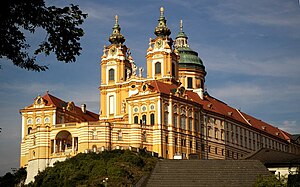 The Wachau is an Austrian valley with a picturesque landscape formed by the Danube river. It is one of the most prominent tourist destinations of Lower Austria , located midway between the towns of Melk and Krems that also attracts “connoisseurs and epicureans ” for its high-quality wines. It is 40 kilometres (25 mi) in length and was already settled in prehistoric times. A well-known place and tourist attraction is Dürnstein , where King Richard the Lion-Heart of England was held captive by Duke Leopold V . The architectural elegance of its ancient monasteries (Melk Abbey and Göttweig Abbey ), castles and ruins combined with the urban architecture of its towns and villages, and the cultivation of vines as an important agricultural produce are the dominant features of the valley. The Wachau is an Austrian valley with a picturesque landscape formed by the Danube river. It is one of the most prominent tourist destinations of Lower Austria , located midway between the towns of Melk and Krems that also attracts “connoisseurs and epicureans ” for its high-quality wines. It is 40 kilometres (25 mi) in length and was already settled in prehistoric times. A well-known place and tourist attraction is Dürnstein , where King Richard the Lion-Heart of England was held captive by Duke Leopold V . The architectural elegance of its ancient monasteries (Melk Abbey and Göttweig Abbey ), castles and ruins combined with the urban architecture of its towns and villages, and the cultivation of vines as an important agricultural produce are the dominant features of the valley.
The Wachau was inscribed as “Wachau Cultural Landscape” in the UNESCO List of World Heritage Sites in recognition of its architectural and agricultural history, in December 2000.
  Austria, officially the Republic of Austria (German: Republik Österreich), is a federal republic and a landlocked country of over 8.5 million people in Central Europe . It is bordered by the Czech Republic and Germany to the north, Hungary and Slovakia to the east, Slovenia and Italy to the south, and Switzerland and Liechtenstein to the west. The territory of Austria covers 83,879 square kilometres (32,386 sq mi). Austria’s terrain is highly mountainous, lying within the Alps; only 32% of the country is below 500 metres (1,640 ft), and its highest point is 3,798 metres (12,461 ft). The majority of the population speak local Bavarian dialects of German as their native language, and Austrian German in its standard form is the country’s official language . Other local official languages are Hungarian , Burgenland Croatian , and Slovene . Austria, officially the Republic of Austria (German: Republik Österreich), is a federal republic and a landlocked country of over 8.5 million people in Central Europe . It is bordered by the Czech Republic and Germany to the north, Hungary and Slovakia to the east, Slovenia and Italy to the south, and Switzerland and Liechtenstein to the west. The territory of Austria covers 83,879 square kilometres (32,386 sq mi). Austria’s terrain is highly mountainous, lying within the Alps; only 32% of the country is below 500 metres (1,640 ft), and its highest point is 3,798 metres (12,461 ft). The majority of the population speak local Bavarian dialects of German as their native language, and Austrian German in its standard form is the country’s official language . Other local official languages are Hungarian , Burgenland Croatian , and Slovene .
The origins of modern-day Austria date back to the time of the Habsburg dynasty when the vast majority of the country was a part of the Holy Roman Empire . From the time of the Reformation , many Northern German princes, resenting the authority of the Emperor, used Protestantism as a flag of rebellion. The Thirty Years War , the influence of the Kingdom of Sweden and Kingdom of France , the rise of the Kingdom of Prussia , and the Napoleonic invasions all weakened the power of the Emperor in the North of Germany, but in the South, and in non-German areas of the Empire, the Emperor and Catholicism maintained control. During the 17th and 18th centuries, Austria was able to retain its position as one of the great powers of Europe and, in response to the coronation of Napoleon as the Emperor of the French , the Austrian Empire was officially proclaimed in 1804. Following Napoleon’s defeat, Prussia emerged as Austria’s chief competitor for rule of a larger Germany. Austria’s defeat by Prussia at the Battle of Königgrätz , during the Austro-Prussian War of 1866 cleared the way for Prussia to assert control over the rest of Germany. In 1867, the empire was reformed into Austria-Hungary . After the defeat of France in the 1870 Franco-Prussian War , Austria was left out of the formation of a new German Empire , although in the following decades its politics, and its foreign policy, increasingly converged with those of the Prussian-led Empire. During the 1914 July Crisis that followed the assassination of Archduke Franz Ferdinand of Austria , Germany guided Austria in issuing the ultimatum to Serbia that led to the declaration of World War I .
After the collapse of the Habsburg (Austro-Hungarian) Empire in 1918 at the end of World War I, Austria adopted and used the name the Republic of German-Austria (Deutschösterreich, later Österreich) in an attempt for union with Germany , but was forbidden due to the Treaty of Saint-Germain-en-Laye (1919) . The First Austrian Republic was established in 1919. In the 1938 Anschluss , Austria was occupied and annexed by Nazi Germany .[14] This lasted until the end of World War II in 1945, after which Germany was occupied by the Allies and Austria’s former democratic constitution was restored. In 1955, the Austrian State Treaty re-established Austria as a sovereign state, ending the occupation. In the same year, the Austrian Parliament created the Declaration of Neutrality which declared that the Second Austrian Republic would become permanently neutral .
Today, Austria is a parliamentary representative democracy comprising nine federal states . The capital and largest city, with a population exceeding 1.7 million, is Vienna . Austria is one of the richest countries in the world , with a nominal per capita GDP of $52,216 (2014 est.). The country has developed a high standard of living and in 2014 was ranked 21st in the world for its Human Development Index . Austria has been a member of the United Nations since 1955, joined the European Union in 1995, and is a founder of the OECD . Austria also signed the Schengen Agreement in 1995, and adopted the euro in 1999.
|





 The Wachau is an Austrian valley with a picturesque landscape formed by the Danube river. It is one of the most prominent tourist destinations of Lower Austria , located midway between the towns of Melk and Krems that also attracts “connoisseurs and epicureans ” for its high-quality wines. It is 40 kilometres (25 mi) in length and was already settled in prehistoric times. A well-known place and tourist attraction is Dürnstein , where King Richard the Lion-Heart of England was held captive by Duke Leopold V . The architectural elegance of its ancient monasteries (Melk Abbey and Göttweig Abbey ), castles and ruins combined with the urban architecture of its towns and villages, and the cultivation of vines as an important agricultural produce are the dominant features of the valley.
The Wachau is an Austrian valley with a picturesque landscape formed by the Danube river. It is one of the most prominent tourist destinations of Lower Austria , located midway between the towns of Melk and Krems that also attracts “connoisseurs and epicureans ” for its high-quality wines. It is 40 kilometres (25 mi) in length and was already settled in prehistoric times. A well-known place and tourist attraction is Dürnstein , where King Richard the Lion-Heart of England was held captive by Duke Leopold V . The architectural elegance of its ancient monasteries (Melk Abbey and Göttweig Abbey ), castles and ruins combined with the urban architecture of its towns and villages, and the cultivation of vines as an important agricultural produce are the dominant features of the valley.
 Austria, officially the Republic of Austria (German: Republik Österreich), is a federal republic and a landlocked country of over 8.5 million people in Central Europe . It is bordered by the Czech Republic and Germany to the north, Hungary and Slovakia to the east, Slovenia and Italy to the south, and Switzerland and Liechtenstein to the west. The territory of Austria covers 83,879 square kilometres (32,386 sq mi). Austria’s terrain is highly mountainous, lying within the Alps; only 32% of the country is below 500 metres (1,640 ft), and its highest point is 3,798 metres (12,461 ft). The majority of the population speak local Bavarian dialects of German as their native language, and Austrian German in its standard form is the country’s official language . Other local official languages are Hungarian , Burgenland Croatian , and Slovene .
Austria, officially the Republic of Austria (German: Republik Österreich), is a federal republic and a landlocked country of over 8.5 million people in Central Europe . It is bordered by the Czech Republic and Germany to the north, Hungary and Slovakia to the east, Slovenia and Italy to the south, and Switzerland and Liechtenstein to the west. The territory of Austria covers 83,879 square kilometres (32,386 sq mi). Austria’s terrain is highly mountainous, lying within the Alps; only 32% of the country is below 500 metres (1,640 ft), and its highest point is 3,798 metres (12,461 ft). The majority of the population speak local Bavarian dialects of German as their native language, and Austrian German in its standard form is the country’s official language . Other local official languages are Hungarian , Burgenland Croatian , and Slovene .


